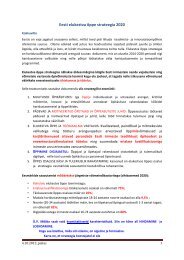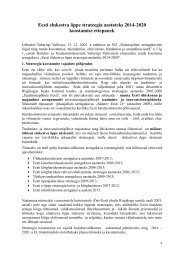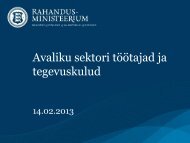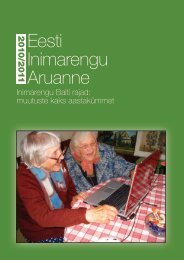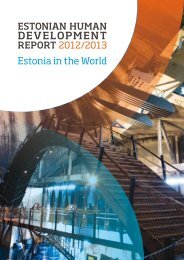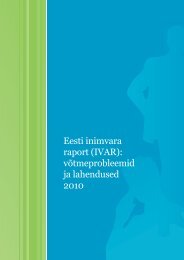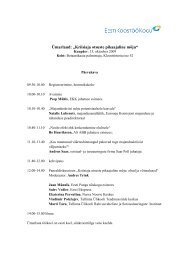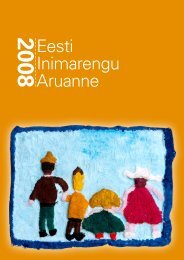Estonian Human Development Report
Estonian Human Development Report - Eesti Koostöö Kogu
Estonian Human Development Report - Eesti Koostöö Kogu
You also want an ePaper? Increase the reach of your titles
YUMPU automatically turns print PDFs into web optimized ePapers that Google loves.
Table 5.3.5. Connections between political activeness and<br />
various online activities (percentage of respondents who<br />
considered a given activity to be either very important or<br />
important with regard to characterizing their Internet use)<br />
General interest in politics<br />
and activeness<br />
Searching for information<br />
on the websites of<br />
local governments<br />
Searching for practical<br />
information (weather,<br />
timetables, etc.)<br />
Communicating with<br />
officials, transaction of<br />
affairs online<br />
Using an online banking<br />
solution<br />
Using e-services (tax<br />
board, forms, etc.)<br />
Participating in<br />
forums, blogs, writing<br />
comments<br />
Participating in civic<br />
initiatives, signing<br />
online petitions<br />
Not at all 6 44 7 50 22 15 3<br />
Little 7 48 15 57 22 16 1<br />
Considerable 14 49 15 68 39 11 4<br />
Significant 22 47 23 71 46 7 2<br />
Very significant 27 48 29 73 46 7 1<br />
Source: Mina. Maailm. Meedia 2008<br />
field, the various institutions and local governments certainly<br />
have many opportunities for further development.<br />
On a critical note, however, it is clear that a significant<br />
and lasting improvement in the quality of life through ICT<br />
can only occur in conjunction with the active participation<br />
of informed and enlightened citizens who have a good<br />
grasp of administrative processes. In order for our citizens<br />
to be able to contribute to this development process, Estonia’s<br />
public institutions should seriously improve their provision<br />
of daily information through e-channels. Another<br />
important step in increasing the e-participation of citizens<br />
involves the refinement of existing participation spaces and<br />
the creation of new ones, thus providing both citizens and<br />
officials with a real experience of deliberative democracy.<br />
<strong>Development</strong> of Internet democracy in Estonia<br />
As in the case of traditional democracy, Estonia’s Internet<br />
democracy is characterized by fast institutional development<br />
– Estonia quickly reached the forefront of the race for implementing<br />
information technology and received international<br />
acclaim with various tables reflecting the speed of development<br />
of information society (see also 5.3.1). However, Estonia’s<br />
initiatives in the field of Internet democracy have not<br />
been very productive. The participation portal TOM (Täna<br />
Otsustan Mina – Today I Decide) which enjoyed both international<br />
attention and relatively active participation in its<br />
initial stage has ceased to exist in its original form. One reason<br />
for this may be the fact that, TOM was characteristic of<br />
online representative democracy rather than actual participatory<br />
democracy, since the citizens did not have the final say<br />
in decision making and the suitability of ideas was decided<br />
by the appropriate ministries and officials. Instead of concentrating<br />
on introducing transparency and involvement,<br />
the primary opportunities and benefits of Internet democracy,<br />
Estonia chose an approach focused predominantly<br />
on officials and aimed at gathering as much information as<br />
possible on everyone in order to provide them with suitable<br />
services. Citizens, however, usually lacked the opportunity<br />
to participate in discussions concerning the services, not to<br />
mention more in-depth political debates. Since citizens are<br />
treated in such cases as customers to be provided with services<br />
instead of active participants in the decision-making<br />
process, the type of e-democracy introduced in Estonia can<br />
be considered an Internet customer democracy rather than<br />
an actual participatory democracy (see, for example, Bellamy<br />
& Taylor 1998; Ridell 2002).<br />
Estonia has impressive legislation for regulating the<br />
information society in addition to experience of legal regulation.<br />
However, most of the applicable political documents<br />
are technicist in orientation and do not contain<br />
much information on the subject of participation.<br />
Although some laws, such as the Public Information Act,<br />
do regulate the Internet use of local governments (e.g. the<br />
structure of websites), the local authorities do not follow<br />
these laws and the decision-making process of many local<br />
governments continues to be opaque.<br />
Changes and developments in e-participation<br />
It is important for the development of e-democracy that new<br />
technological means be used to involve people who are not<br />
interested in the traditional forms of democracy as active<br />
participants in social life. In actuality, we have partially<br />
accomplished this goal. The data of the 2008 Mina. Maailm.<br />
Meedia survey indicates (Table 5.3.5.) that in Estonia online<br />
forums, for example, are used more by people who completely<br />
lack interest in politics. Conversely: only 7% of people<br />
with a very high level of general interest in politics say<br />
that they frequently express their opinions in public online<br />
environments. The same trend generally applies to the practice<br />
of blogging. This confirms the tendency revealed in previous<br />
surveys of online participation in Estonia being more<br />
multifaceted than that of countries with long traditions of<br />
civic culture and free development of democracy. Based<br />
on this trend we can even conclude that the contribution<br />
of the Internet to the development of democracy in general<br />
does manifest itself in increasing the activity of people<br />
who remain passive in traditional channels. However, the<br />
fact that the quality of the content of Internet discussions is<br />
often relatively low causes us to regret the tone-setting role<br />
in this communication environment of people who have no<br />
real interest in politics. Forums originally created for the<br />
purpose of political debate and development of democracy<br />
often become additional means for exchanging news and<br />
practical information, rather than environments for initiating<br />
serious discussions and shaping public opinion.<br />
In order to explore the relationship between people’s<br />
general interest in politics and their use of e-services, we<br />
analyzed the connections between Internet use, general<br />
interest in politics, and the activeness index (the latter is<br />
calculated on the basis of involvement in political parties,<br />
campaigns organized by citizens’ associations, and elections)<br />
(see Table 5.3.5.). In general, most of the people who<br />
actively participate in social life today are Internet users. We<br />
can thus see a connection even between people’s frequency<br />
of use of an online banking application and their higher level<br />
of general political activeness. At the same time, people with<br />
a high level of interest in politics participate rather sparsely<br />
in forums, blogs, and commenting environments as well as<br />
online civic initiatives. We can thus say that for people who<br />
are politically active, technology serves primarily as a means<br />
of simplifying their practical daily activities, rather than an<br />
engaging opportunity to influence the administration of the<br />
country or a local government more efficiently.<br />
One of the most important factors in shaping the connection<br />
between general political activeness and e-participation<br />
is age. Older people who are more active politically<br />
| 114



